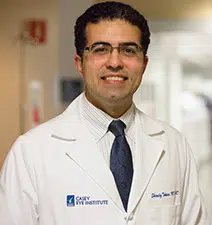2015 Shaffer Research Grants
For information about Shaffer Grants and research reports prior to 2013, please contact Glaucoma Research Foundation.
Spacing: small
Spacing: small

Donald L. Budenz, MD, MPH
University of North Carolina, Chapel Hill, NC
Funded by Dr. Henry A. Sutro Family Grant for Research
Project: Incidence of Glaucoma and Glaucoma Progression in an Urban West African Population
Summary: Glaucoma is the leading cause of irreversible blindness worldwide and disproportionately affects people of African descent because it occurs more frequently, has a younger age of onset, and a more aggressive course than other people groups.

Paul L. Kaufman, MD
University of Wisconsin School of Medicine and Public Health, Madison, Wisconsin
Funded by Funded by the Frank Stein and Paul S. May Grants for Innovative Glaucoma Research Co-funded by The Alcon Foundation
Project: Gene Therapy for Glaucoma
Summary: Glaucoma is often associated with elevated intraocular pressure (IOP).

Richard T. Libby, PhD
University of Rochester Medical School, Rochester, NY
Funded by The Alcon Foundation
Project: Understanding Axonal Degeneration Pathways in Glaucoma
Summary: Loss of vision in glaucoma is caused by the death of a specific type of neuronal cell, the retinal ganglion cell (the neuron that sends information to the brain).

Paloma Liton, PhD
Duke University Eye Center, Durham, NC
Funded by Dr. James and Elizabeth Wise
Project: Lysosomal Enzymes, Glycosaminoglycans and Outflow Pathway Physiology
Summary: Glaucoma is a group of eye diseases that lead to damage to the optic nerve and can result in irreversible blindness.

Lyne Racette, PhD
Indiana University, Indianapolis, IN
Funded by Dr. Miriam Yelsky Memorial Research Grant
Project: Early Detection of Glaucoma Progression using Structural and Functional Data Jointly
Summary: The presence and rate of progression in glaucoma influence clinical decisions, yet the methods currently available to monitor progression are imprecise and do not allow clinicians to make accurate assessments of their patients.

Matthew A. Smith, PhD
University of Pittsburgh, Pittsburgh, PA
Funded by The Frank Stein and Paul S. May Grants for Innovative Glaucoma Research
Project: Measuring the In-vivo Effects on the Optic Nerve Head of Acute Variations in Cerebrospinal Fluid Pressure
Summary: Glaucoma is a leading cause of blindness and visual morbidity worldwide, and yet the pathophysiology of the glaucomatous process is still lacking fundamental understanding even considering recent advancements in imaging technology and genetics.

Shandiz Tehrani, MD, PhD
Oregon Health & Science University, Portland, OR
Funded by The Alcon Foundation
Project: Local Drug Delivery to the Optic Nerve Head as a Novel Treatment in Experimental Glaucoma
Summary: Glaucomatous damage to axons occurs at the optic nerve head (ONH).

Gülgün Tezel, MD
Columbia University, New York, NY
Funded by The Frank Stein and Paul S. May Grants for Innovative Glaucoma Research
Project: Molecular Biomarkers of Glaucoma
Summary: To accomplish better management of glaucoma, our experimental research aims to characterize disease-causing molecular alterations and identify molecules that can be used for clinical testing.